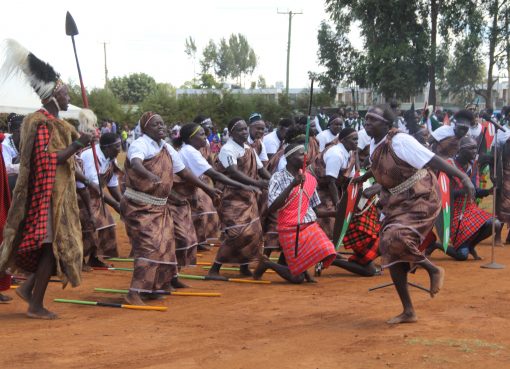Rachel Mwamba aged 28 was the only female student participating in a mechanic’s training organized and sponsored by Kwale-based Australian mining firm Base Titanium.
The mining firm located in the Msambweni sub-county of Kwale, simply known as Base, produces ilmenite, rutile, and zircon, all considered critical minerals and significantly impact the local and national economy.
“I would never let anything deter me from reaching my dreams to be one of the most successful female mechanics in Kwale,” she vows, adding that she has a passion for motorcars and had always aspired to be a ‘lady mechanic.’
Mwamba who is full of energy and vigor and striving to make a change observes that doing engineering work is her way of proving to the skeptical society that women can do much more than just house chores.
Base Titanium has launched an inaugural vocational skills empowerment program to reduce the high rate of unemployment in the coastal county.
Last week, Base Titanium held its 1st graduation for youth sponsored under the ‘Community Skills Program’, a training initiative devised to support youth from villages neighboring the Kwale mine site.
Some 43 local youths were awarded with trade certificates and received different working tools following months of training at the Ukunda Vocational Training Centre.
Each of the beneficiaries received apprenticeship tools and equipment from the mining company to go and start up their own work and businesses.
For Mwamba and her colleagues, the opportunity to pursue their dreams came their way through the Base Titanium-sponsored vocational training and apprenticeship scheme.
For many, mechanical work is still viewed as a ‘man’s job’ but Mwamba who hails from Fihoni village in Kinondo ward never hesitated to follow her childhood dream.
The first cohort of 43 graduated after acquiring vocational skills in various trades including engineering, carpentry, welding, masonry, refrigeration and air conditioning, beauty therapy, tailoring, and dressmaking among other practical skills.
Youth selected from the community are enrolled in local vocational training institutes to economically empower them by building their technical skills.
Mwamba who is breaking barriers says the perception among the society is that mechanical engineering is a physically demanding sector that does not favour women.
“For me I refused to comply with the misconception that women cannot study machines and thank God my family encouraged me because it is rare in our community to see a girl doing mechanics,” she said, adding that she was derided for choosing to pursue a ‘masculine career’.
She went further, “In the beginning even my male counterparts sometimes tried to intimidate me during the training but since I am a go-getter I persevered.”
Over a period of six months, she had the chance to take part in theoretical and practical classes and get a comprehensive understanding of the profession.
Mwamba who is the third born in a family of five says some women avoid mechanical courses because of the greased hands, heavy overalls and coveralls that come with the profession.
“Whereas most people consider this a job for men, I am happy that the youth are determined to change this perception,” she says, adding that she has long admired engineering work.
The motor vehicle mechanic says she has embraced technical education to pursue mechanical engineering because that has been her passion since childhood.
Mwamba says she is saddened that many girls still shun vocational education and end up in fields considered feminine such as hairdressing, where they fail to get employment.
“I hope to open my own garage someday to support my family and to contribute to the development of my community,” she quipped, adding that her move would send positive signals to girls to choose a career in mechanical engineering.
Mwamba says the fact that she was among the best students proves that women are capable of competing with their male counterparts in all fields.
Mechanical engineering is the study of physical machines that may involve force and movement. It is an engineering branch that combines engineering physics and mathematics principles with materials science, to design, analyze, manufacture, and maintain mechanical systems.
Base Titanium General Manager (GM) External Affairs manager Simon Wall says the ‘Community Skills Project’ ‘s main objective is to enhance young people’s livelihood opportunities by unlocking opportunities through vocational training.
“Since we launched this training program we are happy that the youth are all motivated to learn new skills and contribute to the community,” he says.
Wall says training and development are sure steps to empowering young people to contribute to the economy of the country.
He says the mining company has found that the majority of the youth have attended school but the quality of their education has left them lacking the skills necessary to be self-reliant and compete out there.
Wall says a further 75 youth are currently undertaking similar hands-on skills in local technical and vocational institutions and called on more females to embrace vocational studies.
He congratulated the pioneer graduating students and implored them to apply the skills acquired to justify the time and resources invested in the training.
Msambweni sub-county Deputy County Commissioner (DCC) Kipkech Lotiatia says the government is pursuing deliberate policies to make technical and vocational education and training easy and more lucrative to generate the interest of young people in the country.
Lotiatia says technical and vocational interventions by the government have made it easy for women to penetrate male-dominated jobs such as auto mechanical engineering, construction, and welding.
The DCC called for a change in people’s attitudes in technical training programs, noting that girls are as good as boys in technical and vocational skills.
He says technical skills are desirable in the workplace more so in countries that are labour insufficient.
By Hussein Abdullahi





